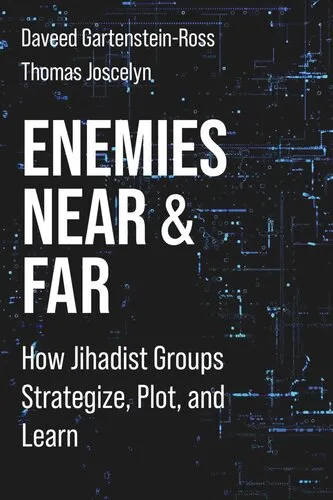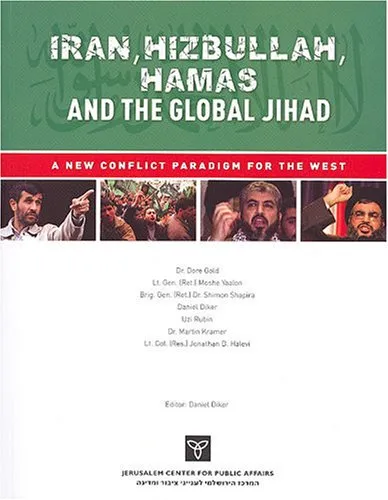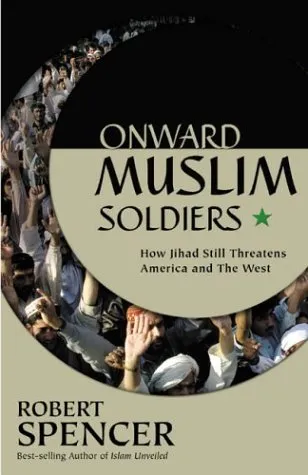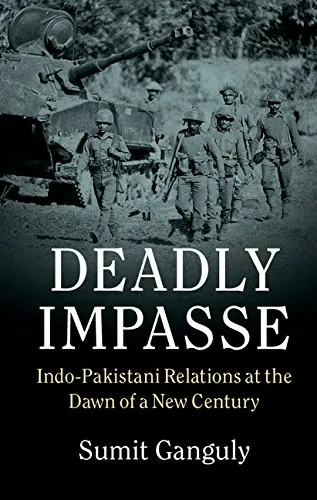Seeds of Hate: How America's Flawed Middle East Policy Ignited the Jihad
4.0
بر اساس نظر کاربران

شما میتونید سوالاتتون در باره کتاب رو از هوش مصنوعیش بعد از ورود بپرسید
هر دانلود یا پرسش از هوش مصنوعی 2 امتیاز لازم دارد، برای بدست آوردن امتیاز رایگان، به صفحه ی راهنمای امتیازات سر بزنید و یک سری کار ارزشمند انجام بدینکتاب های مرتبط:
معرفی جامع کتاب "Seeds of Hate: How America's Flawed Middle East Policy Ignited the Jihad"
کتاب "Seeds of Hate" یکی از آثار شناختهشده لارنس پینتاک است که به طور خاص به بررسی سیاستهای اشتباه ایالات متحده در خاورمیانه پرداخته و تأثیرات این سیاستها را بر ظهور و گسترش جهادگرایی بررسی میکند. این کتاب با تحلیلی عمیق و دقیق، به ریشههای تنفر و خشونت در روابط بینالمللی میپردازد و درک جدیدی از محیط سیاسی و اجتماعی خاورمیانه ارائه میدهد.
خلاصهای از کتاب
کتاب "Seeds of Hate" با بررسی تاریخ روابط آمریکا و خاورمیانه، نگاهی انتقادی به سیاستهای واشنگتن میاندازد که بسیاری از آنها عامل برانگیخته شدن احساسات ضدآمریکایی در میان ملتهای خاورمیانه بوده است. نویسنده در این اثر به مواردی همچون حمایت بیقید و شرط از اسرائیل، دخالتهای نظامی در کشورهای اسلامی، و بیتوجهی به خواستههای مشروع مردم منطقه اشاره میکند. او تأکید میکند که این سیاستها، بذر نفرت و دشمنی را در دل میلیاردها مسلمان کاشته است، و این نفرت در نهایت به جهادگرایی منجر شده است.
پینتاک با استفاده از شواهد گسترده تاریخی و نقلقولهایی از رهبران جهان اسلام، نشان میدهد که چگونه اشتباهات استراتژیک آمریکا در دهههای گذشته منجر به ظهور گروههای افراطی نظیر القاعده و دیگر جنبشهای جهادی شده است. او همچنین بررسی میکند که رسانههای غربی چه نقشی در شکلدهی به این فضا داشتهاند و چگونه اطلاعات نادرست و کلیشههای فرهنگی، جایگزین درک واقعی از منطقه شدهاند.
نکات کلیدی
- تأثیر تصورات نادرست فرهنگی بر سیاستهای بینالمللی آمریکا و افزایش شکافهای فرهنگی.
- نقش رسانههای آمریکایی در شکلدهی به احساسات ضداسلامی و پشتیبانی از پروژههای نظامی.
- پیامدهای جهانی حمایت آمریکا از اسرائیل بر صلح خاورمیانه و گسترش جهادگرایی.
- ارتباط میان سیاست خارجی آمریکا و رادیکالیزم اسلامی در دهههای اخیر.
- پیشبینی تأثیرات بلندمدت چنین رویکردهایی بر امنیت جهانی و روابط آمریکا با کشورهای مسلمان.
جملات معروف از کتاب
“The seeds of jihad were not planted in a vacuum; they were cultivated by decades of failed Western policies.”
“It is not religion that fuels jihad, but the bitterness and frustration caused by decades of injustice and oppression.”
“Without understanding the history of the region, America's repeated mistakes in the Middle East are bound to continue.”
چرا این کتاب اهمیت دارد؟
کتاب "Seeds of Hate" یکی از مهمترین منابع برای درک روابط پیچیده میان ایالات متحده و خاورمیانه است. این اثر با ارائه تصویری شفاف از گذشته و حال این رابطه، به خوانندگان کمک میکند تا از کلیشهها و دیدگاههای قالبی عبور کنند و به عمق این مسئله پیچیده پی ببرند. برای سیاستگذاران، دانشجویان، و علاقهمندان به تاریخ و سیاست بینالملل، این کتاب یک اثر ضروری است که با تحلیلهای عمیق خود میتواند به تغییر نگاهها و رویکردها کمک کند.
لارنس پینتاک، با تکیه بر دههها تجربه در منطقه و دانش گستردهاش از تاریخ و فرهنگ، توانسته اثری بیافرینند که خواننده را به تفکر در مورد نقش خود در ایجاد جهانی بهتر دعوت میکند.
Introduction to "Seeds of Hate: How America's Flawed Middle East Policy Ignited the Jihad"
Written by Lawrence Pintak, Seeds of Hate delves deep into the intersection of U.S. foreign policy in the Middle East and the growth of Islamist extremism. In this eye-opening book, the author unpacks how decades of U.S. actions in the region — often driven by short-term political and economic interests — have fueled resentment, destabilized nations, and inadvertently sown the seeds of radicalism. This work is an unflinching exploration of why America's approach to the region has been not only strategically flawed but also deeply misunderstood.
Published amidst the turbulence of growing anti-American sentiment post-9/11, the book offers a necessary critique of decisions that have shaped the contemporary Middle East. Rather than simply recounting historical events, Pintak connects the dots between policy missteps and the rise of jihadist ideologies, revealing a complex tapestry of betrayal, intervention, and unintended consequences.
This introduction sets the tone for a thought-provoking narrative that challenges conventional wisdom and urges readers to re-evaluate America's role in the Middle East, not through the lens of idealism but in harsh, pragmatic reality.
Detailed Summary of the Book
The book chronicles key moments in American-Middle Eastern relations, illustrating how diplomatic, military, and economic decisions have contributed to the animosity underlying jihadist movements. Lawrence Pintak starts by highlighting American policies during the Cold War, which laid the groundwork for mistrust and manipulation. He examines the blind support for autocratic regimes, the covert operations to destabilize governments, and the glaring contradictions in U.S. rhetoric about democracy and freedom.
The narrative then shifts to the post-World War II era, focusing on U.S. involvement in Iran, the Arab-Israeli conflict, and the Gulf Wars. Pintak carefully unpacks the CIA-backed coup in Iran (1953), the unwavering support for Israel, and the disastrous consequences of arming Afghan Mujahideen during the Soviet invasion — a decision that indirectly set the stage for the rise of groups like al-Qaeda and the Taliban. The book sheds light on how these policies were driven by economic gains, especially related to oil, often at the expense of the people in the region.
Pintak doesn’t stop at government policies but also critiques the American media's portrayal of the Middle East, which he argues perpetuates stereotypes and deepens cultural divides. His account exposes how media narratives shape public opinion, fostering fear and misunderstanding of Islam and its followers.
Key Takeaways
- U.S. policies in the Middle East have often prioritized political and economic interests over human rights, democracy, and stability.
- The support for authoritarian regimes and interventionist strategies have fueled widespread resentment among ordinary people in the region.
- The rise of jihadism is not simply a religious phenomenon but a reaction to decades of exploitation, humiliation, and foreign interference.
- Media representation of the Middle East and Islam has contributed significantly to the American public's misunderstanding of the region.
- Understanding the historical context of U.S.-Middle East relations is essential to addressing current tensions and preventing further cycles of violence.
Famous Quotes from the Book
- "History is a haunting specter, especially when ignored."
- "The anger that fuels the jihad did not emerge in a vacuum — it was nurtured by political manipulation, betrayal, and hypocrisy."
- "America champions democracy and freedom but often sides with those who suppress both."
- "Jihadism is the symptom; the disease lies in the wounds inflicted by decades of foreign interference."
- "A policy built on short-term gains will ensure long-term chaos."
Why This Book Matters
In an era when headlines are dominated by conflicts in the Middle East, terrorism, and global security concerns, Seeds of Hate remains a crucial resource for understanding the roots of these crises. Lawrence Pintak’s meticulous research and compelling arguments challenge us to think critically about America's role on the world stage. The book underscores the importance of historical context, offering readers a lens through which to view contemporary issues in the region.
More importantly, this book forces readers to confront uncomfortable truths: that America's actions are often driven as much by self-interest as by ideology, and that these actions carry long-term ramifications, many of which are still being felt today. By providing insight into how and why America has gotten it wrong in the Middle East, Pintak not only aids in understanding the “why” but also offers a roadmap for avoiding further mistakes.
Seeds of Hate is an essential read for policymakers, academics, journalists, and anyone seeking to understand the intricate web of history, politics, and culture that connects the United States and the Middle East. It is a call to rethink the narratives and approaches that have defined this fraught relationship for too long.
دانلود رایگان مستقیم
شما میتونید سوالاتتون در باره کتاب رو از هوش مصنوعیش بعد از ورود بپرسید
دسترسی به کتابها از طریق پلتفرمهای قانونی و کتابخانههای عمومی نه تنها از حقوق نویسندگان و ناشران حمایت میکند، بلکه به پایداری فرهنگ کتابخوانی نیز کمک میرساند. پیش از دانلود، لحظهای به بررسی این گزینهها فکر کنید.
این کتاب رو در پلتفرم های دیگه ببینید
WorldCat به شما کمک میکنه تا کتاب ها رو در کتابخانه های سراسر دنیا پیدا کنید
امتیازها، نظرات تخصصی و صحبت ها درباره کتاب را در Goodreads ببینید
کتابهای کمیاب یا دست دوم را در AbeBooks پیدا کنید و بخرید
1411
بازدید4.0
امتیاز0
نظر98%
رضایتنظرات:
4.0
بر اساس 0 نظر کاربران
Questions & Answers
Ask questions about this book or help others by answering
No questions yet. Be the first to ask!















